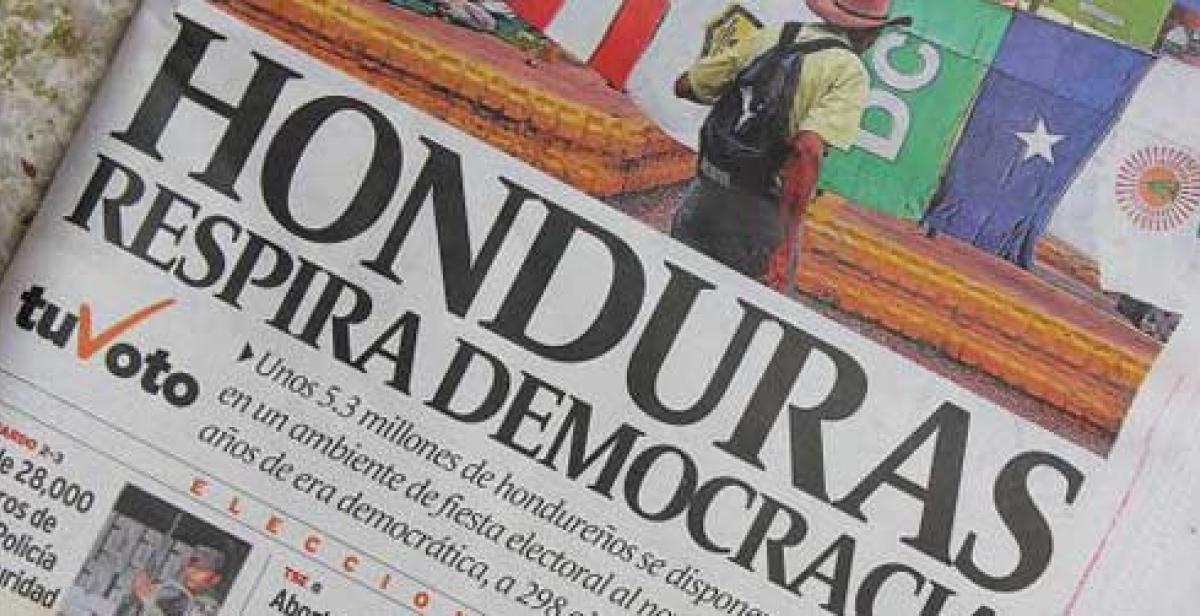It’s been an important week for politics in Honduras, as Presidential elections have taken place. These elections were seen as a test of democracy for the country, as its political life has always been turbulent.
It was interesting for our group to be in Honduras for the elections. Even though we were confined to our house for a few days for safety reasons, we were able to experience the atmosphere leading up to Election Day with our national volunteers, who then travelled home to vote. From when we arrived in La Esperanza, election campaigning was fully underway- there were banners and posters everywhere, flags flying from cars, houses and shops, and political graffiti dotted around. Nearer the election, enthusiasm intensified with long political rallies and gatherings in the city. The week of the election, the military moved into La Esperanza to supervise the mobilisation of the ballot boxes and ensure there was no trouble, meaning roads were closed and there was a heavy presence of security. We felt conscious of what we were wearing, as we didn’t want to be associated with a party colour.
We were surprised to see the level of political involvement that the 3 communities we work with had. There were just as many flags flying around rural areas as in the town, and on rally days the communities were empty, with truckloads being transported to La Esperanza. There was a national ID Card tour that came to all the communities: you need an ID card to vote, so it gave anyone who lacked it a chance to get one in time. On Election Day there were polling stations in each community too, minimising transportation problems as a barrier to political participation.
However, the problem is that it seems particularly rural communities are very vulnerable to being manipulated. As in all countries, parties come around to the communities and make promises, accompanied by party flags to display. They can use the communities’ often lack of contact with the situations around the country to offer small unsustainable things like beans, and make sure they plant the idea of permanent change in their minds. Furthermore, as is normal for political parties, the days before the elections we saw roads being paved with lorries bearing a party’s flags, and pedestrian crossings being painted with all the workers wearing one of the parties’ t-shirts. Significantly, the government handed out education grants to parents in the days leading up to the election, resulting in long queues all around the city.
Honduras’ political past makes an interesting read: tiptoeing around democracy, but being hindered by years of military rule and political polarisation. The main problem it has deeply struggled with, that impedes it being a democracy more than many countries is corruption, that runs deep in the government and further in society. On the Freedom House Index, Honduras only has a score of 4 for categories of Freedom, Civil Liberties and Political Rights, where 1 is the highest and 7 is the lowest. In 2009 the country had a military coup that overthrew its government; the President from the Liberal party, Zelaya, was famously exiled in his pyjamas, for apparently being unconstitutional by attempting to alter the constitution. His government brought in a lot of socialist-leaning reforms, moving towards a welfare system. The more right-wing Nacional party, who are in power now, won the elections soon after the coup.
Last week, the much-anticipated day of the elections passed without significant incident or violence, which had been a worry for the country. The results were slow to be counted, although in the meantime both leading candidates – Xiomara Castro from LIBRE and Juan Orlando from Nacional – declared victory as the new president. Days later, Orlando was officially named the winner.
The official word of the election from the TSE (Supreme Electoral Tribunal in Honduras) and national and international observers is that everything went as it should, with no fraud, no inconsistencies and full transparency. However, there are Hondurans that we have spoken to who don’t believe this and still have doubts about the election’s legitimacy, and some have taken to the streets to protest this. The LIBRE party has filed an official complaint and is presenting its evidence of fraud to the TSE. Other word on the street is talking about vote buying- such as handing out food, money and concrete outside polling stations- which is very hard to prove and do anything about. There are also allegations of copying ID Cards to create more votes, and vote numbers being changed from the initial count to being inputted on the central system.
Many types of fraud in elections can go undetected by observers as they are difficult to prove, and there are blatant and less blatant ways of elections failing to meet democratic standards, it isn’t always obvious. Honduras is a good example of how there is rarely ‘democratic’ and ‘undemocratic’ in politics; it has democratic procedures and structures in place, but there are too many things that just don’t add up in the process.
Written by Ellie Wasan



